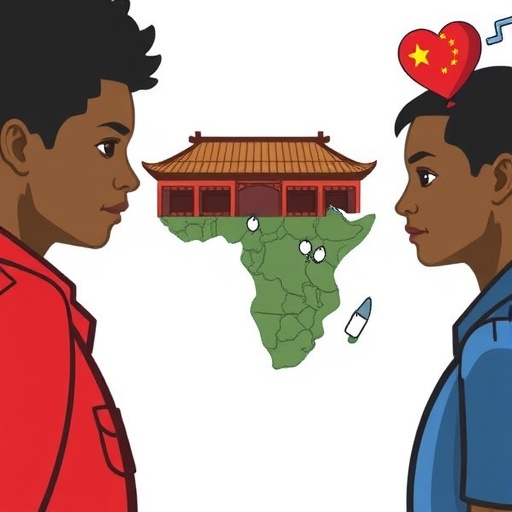In a groundbreaking study, researchers Wu, Hou, and Fang turned their attention to the intricate realities faced by African students enrolled in a university in China. Their work, titled “Performing ‘alterity’: global geographies of power, translocal subjectivity, and everyday identity negotiation of African students at a university in China,” encapsulates the challenges and transformations experienced by these students. Conducted over an extended period, the research delves into both the micro and macro factors influencing the students’ identities and experiences in an environment that is often foreign and sometimes unfriendly.
Through a series of interviews and observational studies, the researchers collected qualitative data that paints a vivid picture of the African students’ lives in China. They highlighted the concept of ‘alterity,’ which refers to the ‘otherness’ that defines and distinguishes one group from another. The notion of alterity serves as a critical lens through which the researchers explored how African students negotiated their identities amidst prevailing global geographies of power. This negotiation is not merely personal; it reflects broader socio-political dynamics at play, both in China and globally.
African students in Chinese universities are often subject to various types of discrimination and stereotyping. The researchers noted that while these students might initially aim for academic success, their experience is overshadowed by their race and ethnicity. They encounter preconceived notions about who they are based on societal narratives perpetuated by media and historical relations between Africa and China. This external perception deeply affects their self-identity and feelings of belonging, making their college experience uniquely complex.
Furthermore, the study highlights the cultural dissonance that African students experience. Many arrive in China with anticipations of cultural exchange and opportunity, yet they are often met with societal silence on race and ethnicity. This lack of engagement can create feelings of isolation and alienation. Students reported feeling as if they were on the periphery of campus life, despite being physically present. Such experiences underscore the critical need for educational institutions to foster an inclusive atmosphere where diversity is celebrated and constructive dialogues about race can occur.
Over time, many African students develop creative strategies to negotiate their identities within the university system. These strategies range from building solidarity with other international students to finding mentor figures among faculty who understand their plight. The students often embrace their ‘otherness’ as a source of strength, transforming their experiences of marginalization into opportunities for self-affirmation and empowerment. This resilience indicates a complex interplay of resistance and adaptation as they navigate their educational journeys.
In an educational landscape that is increasingly globalized, understanding the experiences of African students in China provides valuable insights into the dynamics of international education. The study demonstrates how educational institutions can better serve their diverse student populations by acknowledging and addressing the unique experiences and challenges faced by students from different cultural backgrounds. It emphasizes the importance of creating learning environments that are not only academically rigorous but also culturally responsive and inclusive.
The research also calls for policies that reflect the necessity for intercultural competence among faculty and staff. By equipping educators with the skills needed to engage with students from diverse backgrounds, universities can foster more supportive and enriching educational experiences. Such training should include understanding the historical and cultural contexts that shape students’ identities, particularly those from Africa, as well as promoting inclusive pedagogies that empower all students to thrive.
Moreover, as global movements of people continue to reshape the educational landscape, the importance of intersectionality cannot be overstated. African students do not enter Chinese institutions as blank slates, but rather as individuals shaped by their unique cultural backgrounds and social identities. Recognizing and valuing these differences is crucial for facilitating meaningful interactions and enhancing the overall educational experience for all students.
As we reflect on the contributions of Wu, Hou, and Fang’s research, it is clear that the subject of translocational identities and the negotiation of self within global contexts is urgent and necessary. The findings not only contribute significantly to the academic discourse on education and migration but also hold essential implications for policy-makers, educators, and institutions committed to fostering diversity and inclusion in higher education.
In conclusion, the negotiation of identity among African students in China is a microcosm of broader global trends concerning race, power, and belonging. The experiences captured in this research underline the significance of understanding the ways in which educational environments can either constrain or empower international students. By addressing the themes of alterity and identity negotiation, this study provides a poignant reminder of the complex realities of globalization and the imperative for empathy and inclusivity in educational institutions.
As the field of education continues to evolve with increased internationalization, studies like this illuminate the need for active reflection and proactive measures to ensure that diverse voices are valued and heard. This research acts as a call to action for universities to prioritize discussions around race, identity, and culture, forging pathways for a more equitable and inclusive educational landscape in the future.
Subject of Research: Identity negotiation of African students in Chinese universities.
Article Title: Performing ‘alterity’: global geographies of power, translocal subjectivity, and everyday identity negotiation of African students at a university in China.
Article References: Wu, D.B., Hou, S. & Fang, F. Performing ‘alterity’: global geographies of power, translocal subjectivity, and everyday identity negotiation of African students at a university in China. High Educ (2025). https://doi.org/10.1007/s10734-025-01570-5
Image Credits: AI Generated
DOI: https://doi.org/10.1007/s10734-025-01570-5
Keywords: African students, China, identity negotiation, translocal subjectivity, alterity, globalization, education, cultural diversity, higher education, race relations.




